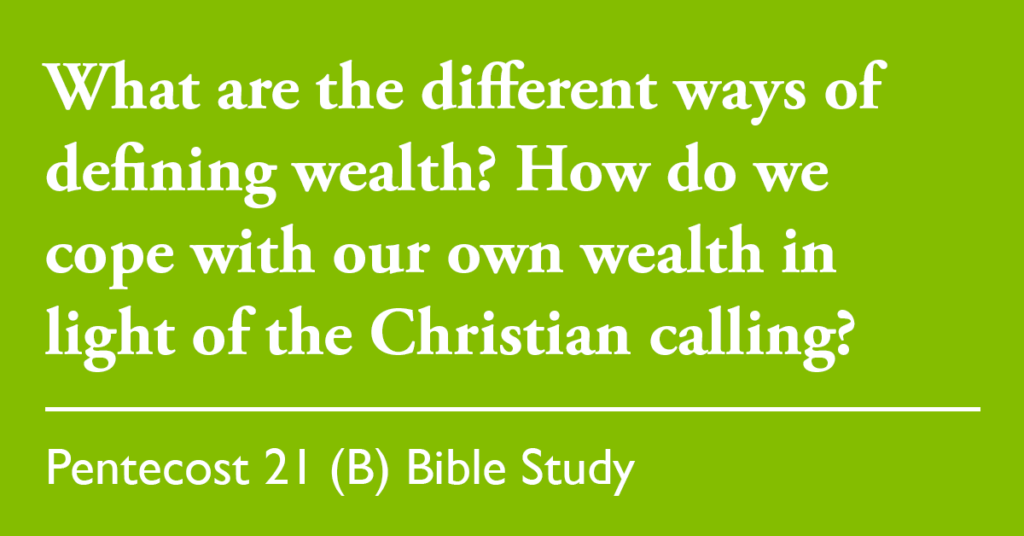This page is available in: Español
Bible Study: Pentecost 21 (B) – October 13, 2024
October 13, 2024
Note: During the 2024 Season after Pentecost, Sermons That Work will use Track 2 readings for sermons and Bible studies. Please consult our archives for many additional Track 1 resources from prior years.
RCL: Amos 5:6-7,10-15; Psalm 90:12-17; Hebrews 4:12-16; Mark 10:17-31

Life is full of paradoxes, maybe even to the point where it is inconsistent and incoherent. It is in tension not only between the normative and the descriptive, the actual and the potential, the being and yet to be in human life, but also between God’s absoluteness and God’s love of all.
There seems little doubt that the Gospel selection is composed of multiple, probably originally, disjointed parts. Various scholars offer multiple interpretive brackets and groupings of the verses, leading to unique interpretive bridges. Some more traditional scholars organize the sections from verses 17 to 22, verses 23 to 27, and verses 28 to 31. However, verses 23 to 27 are not necessarily uniform, either. Alternatively, one can interpret verses 24 and 26 as inserts, resulting in 23 and 25 belonging together and verses 23 to 24a still being part of the first story. The fractured nature of the reading itself can lead to interpretive strain.
The paradox of finite life in light of the omnipotent God is coming to a sharp culmination in this selection, absent of a straightforward solution. God, the only one worthy of the attribute “good,” in their absolute sovereignty, may accomplish the impossible: salvation of the people. And yet, exactly there is the almost unbearable tension; the people’s actions are not all the same. Another paradox: They are of value because of and in spite of God’s absolute sovereignty.
The bliss of seeming compliance with all commandments by the rich man is confronted by the harsh reality of the bottomlessness, the inexhaustibility, and the ultimate impossibility of the task at hand; there is always a new command, born out of love, actually. A new quest, always more. The tension leads to one of a few instances of open refusal despite a burning desire. The sudden realization manifests in the shock of the disciples; they gave it all, possessions included, but even that doesn’t seem to be enough.
Another tension is interwoven in this field of action, reaction, and reception. The wealth motif, present in other gospels, looms large over the eye of the needle. Again, the tension is not resolved in a pleasing manner. Wealth, understood as accumulation, is a flow of exploitation and depletion of one side. The passage from Amos dwells on this point in eloquent detail. Jesus’ interaction with the poor widows is far from glorifying a depleted state as a desirable living condition. And yet, there is no refusal of wealthy benefactors or a good banquet (Mark 15:40-41, Matt 27:57, Luke 5:27-29). The award named in the passage for the faithful disciples is, in a rare instance, a certain amount of earthly goods in addition to eternal ones. One could stretch so far as to say that wealth for all is promoted, which is exactly, in the paradox, the absence of wealth, as there would be no uneven accumulation.
And there is the actual culmination: As with the well-being of all without uneven accumulation, or with the commandments and steps toward the Kingdom of God overall, it is an impossible feat, bottomless, in dire need, and so worthy of divine intervention. And still, the people’s actions are not all the same; they affect, enmeshed in the further tension of what the epistle puts in full display, the normative and the actual.
The overall tensions in these readings are not resolved. They are there to stay and to be endured without the easy way out, without swinging to one or the other side, between trying all and ending in despair and giving up right away.
Discussion Questions
- What is wealth? What are the different ways of defining wealth? How do we cope with our own wealth in light of the Christian calling?
- How does one cope with endless, bottomless, unfulfillable demand in light of human limitations, human nature, and human desire to compete with one’s neighbor for both prestige and finite resources?
Dr. Carolin Frueh is currently in the process of obtaining an M.Div. from Church Divinity School of the Pacific for bivocational ministry. She holds a Ph.D. in physics and researches satellites and space debris.
This page is available in: Español
Don’t forget to subscribe to the Sermons That Work podcast to hear this sermon and more on your favorite podcasting app! Recordings are released the Thursday before each liturgical date.
Receive Free Weekly Sermons That Work Resources!
This page is available in: Español


